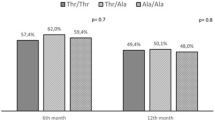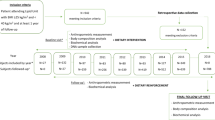Abstract
OBJECTIVE: To determine the extent of variation in the gene for peroxisome proliferator activated receptor γ (PPARγ) in patients with morbid obesity.
SUBJECTS: Two hundred morbidly obese patients who underwent gastric banding surgery and 192 healthy blood donors. Diabetics were excluded.
EXPERIMENTAL: The frequency of the P115Q and P12A variants in the PPARγ gene was determined. Single strand conformational polymorphism (SSCP) analysis was performed on all exons, exon/intron boundaries and part of the promoter of the PPARγ gene on a sub-group of 67 morbid obese patients.
RESULTS: None of the morbid patients or the blood donors were carriers of the P115Q mutation. The frequency of the P12A polymorphism did not differ significantly between morbid obese patients and controls and there was no statistically significant association between P12A and BMI. Male blood donors who were A12A homozygotes had statistically significant higher serum leptin concentrations (P=0.001). Mutation screening revealed that one patient had a T →G transversion at −208 in the promoter of PPARγ-2, two had silent mutations, one a T→C transition in the third base of codon 144 and the other a C→T transition in codon 297. The fourth patient had a CGC→TGC transition in codon 316 resulting in the replacement of an arginine with a cysteine. This mutation was not found in any other morbidly obese patient.
CONCLUSION: Variation in the PPARγ gene is unlikely to play a major role in the development of morbid obesity.
This is a preview of subscription content, access via your institution
Access options
Subscribe to this journal
Receive 12 print issues and online access
$259.00 per year
only $21.58 per issue
Buy this article
- Purchase on Springer Link
- Instant access to full article PDF
Prices may be subject to local taxes which are calculated during checkout

Similar content being viewed by others
References
Chagnon YC, Peruse L, Bouchard C . Familial aggregation of obesity, candidate genes and quantitative trait loci Curr Opin Lipidol 1997 8: 205–211.
Montague CT, Sadaf Farooqi I, Whitehead JP, Soos MA, Rau H, Wareham NJ, Sewter CP, Cigby JE, Mohammed SN, Hurst JA, Cheetham CH, Early AR, Barnett AH, Prins JB, O'Rahilly S . Congenital leptin deficiency is associated with severe early-onset obesity in humans Nature 1997 387: 903–908.
Schoonjans K, Staels B, Auwerx J . Role of the peroxisome proliferator-activated receptor (PPAR) in mediating the effects of fibrates and fatty acids on gene expression J Lipid Res 1996 37: 907–925.
Spiegelman BM, Flier JS . Adipogenesis and obesity: rounding out the big picture Cell 1996 87: 377–389.
Brun RP, Kim JB, Hu E, Spiegelman BM . Peroxisome proliferator-activated receptor gamma and the control of adipogenesis Curr Opin Lipidol 1997 8: 212–218.
Tontonoz P, Hu E, Spiegelman BM . Stimulation of adipogenesis in fibroblasts by PPARγ2, a lipid-activated transcription factor Cell 1994 79: 1147–1156.
Ristow M, Müller-Wieland D, Pfeiffer A, Krone W, Kahn CR . Obesity associated with a mutation in a genetic regulator of adipocyte differentiation N Engl J Med 1998 339:: 953–959.
Yen C-J, Beamer BA, Negri C, Silver K, Brown KA, Yarnall DP, Burns DK, Roth J, Shuldiner, AR . Molecular scanning of the human peroxisome proliferator activated receptor γ (hPPARγ) gene in diabetic caucasians: Identification of a pro12ala PPARγ2 missense mutation Biochem Biophys Res Commun 1997 241: 270–274.
Okazawa H, Mori H, Tamori Y, Araki S, Niki T, Masugi J, Kawanishi M, Kubota T, Shinoda H, Kasuga M . No coding mutations are detected in the peroxisome-activated receptor-γ gene in Japanese patients with lipoatrophic diabetes Diabetes 1997 46: 1904–1906.
Vigouroux C, Fajas L, Khallouf E, Meier M, Gyapay G, Lascols O, Auwerx J, Weissenbach J, Capeau J, Magre J . Human peroxisome proliferator-activated receptor-γ2. Genetic mapping, identification of a variant in the coding sequence, and exclusion as the gene responsible for lipoatrophic diabetes Diabetes 1998 47: 490–492.
Beamer BA, Yen C-J, Andersen RE, Muller D, Elahi D, Cheskin LJ, Andres R, Roth J, Shuldiner A . Association of the pro12ala variant in the peroxisome proliferator-activated receptor-γ2 gene with obesity in two Caucasian populations Diabetes 1998 47: 1806–1808.
Deeb SS, Fajas L, Nemoto M, Pihlajamäki J, Mykkänen L, Kuusisto J, Laakso M, Fujimoto W, Auwerx J . A pro12ala substitution in PPARγ associated with decreased receptor activity, lower body mass index and improved insulin sensitivity Nature Genet 1998 20: 284–287.
Ek J, Urhammer SA, Sorensen TIA, Andersen T, Auwerx J, Pedersen O . Homozygosity of the peroxisome proliferation-activated receptor-γ2 (PPAR-γ2): divergent modulating effects on body mass index in obese and lean Caucasian men Diabetologia 1999 42: 892–895.
Meirhaeghe A, Fajas L, Helbecque N, Cottel D, Lebel P, Dallongeville, J, Deeb S, Auwerx J, Amouyel P . A genetic polymorphism of the peroxisome proliferator-activated receptor-γ gene influences plasma leptin levels in obese humans Hum Mol Genet 1998 7: 435–440.
Ringel J, Engeli S, Distler A, Sharma AM . Pro12Ala missense mutation of the peroxisome proliferator-activated receptor-γ and diabetus mellitus Biochem Biophys Res Commun 1999 254: 450–453.
Mancini FP, Vaccaro O, Sabatino L, Tufano A, Rivellese AA, Riccardi G, Colantuoni V . Pro12Ala substitution in the peroxisome proliferator-activated receptor-γ2 is not associated with type II diabetes mellitus Diabetes 1999 48: 1466–1468.
Koch M, Rett K, Maerker E, Volk A, Haist K, Deninger M, Renn W, Häring HU . The PPAR-γ2 amino acid polymorphism Pro12ala is prevalent in the offspring of type II diabetic patients and is associated to increased insulin sensitivity in a subgroup of obese subjects Diabetologia 1999 42: 758–762.
Acknowledgements
We thank Dr Wittkopf of the Blood Transfusion Centre, Universitätskrankenhaus Eppendorf, Hamburg for provision of the control blood samples and Dr Ristow for kindly providing the mutant clone of P115Q.
This work was supported by grants from the Deutsche Forschungsgemeinschaft to DE (Ev 29/2-1) and AM (Ma 1101/4-1) and by Graduiertenkolleg 336 (GRK 336).
Author information
Authors and Affiliations
Corresponding author
Rights and permissions
About this article
Cite this article
Evans, D., Mann, W., de Heer, J. et al. Variation in the gene for human peroxisome proliferator activated receptor γ (PPARγ) does not play a major role in the development of morbid obesity. Int J Obes 24, 647–651 (2000). https://doi.org/10.1038/sj.ijo.0801214
Received:
Revised:
Accepted:
Published:
Issue Date:
DOI: https://doi.org/10.1038/sj.ijo.0801214
Keywords
This article is cited by
-
Phenotype and genotype predictors of BMI variability among European adults
Nutrition & Diabetes (2018)
-
Posttranslational Modifications of PPAR‐γ: Fine‐tuning the Metabolic Master Regulator
Obesity (2009)
-
Upper abdominal obesity, insulin resistance and breast cancer risk
International Journal of Obesity (2002)
-
The Human Obesity Gene Map: The 2000 Update
Obesity Research (2001)



